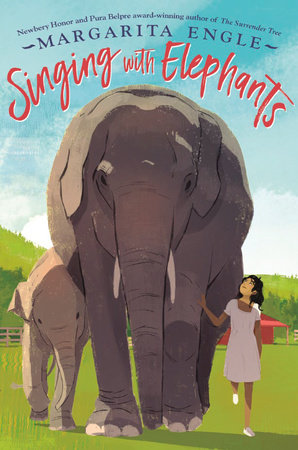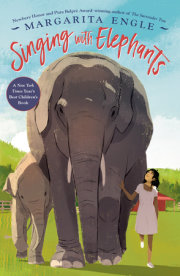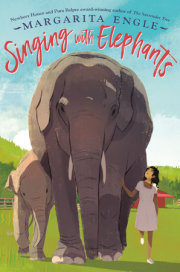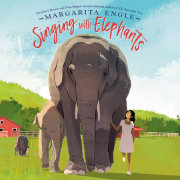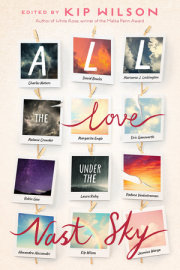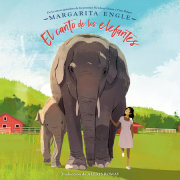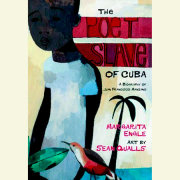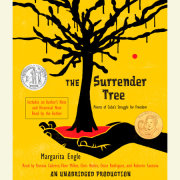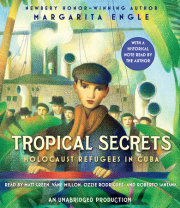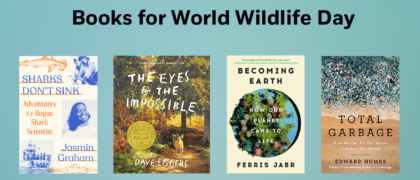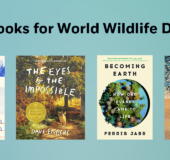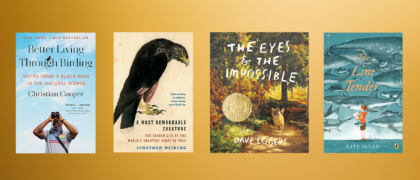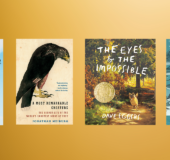POETRY IS A DANCE
of words on the page.
These poems are a story
about the summer
I learned
how to twirl
and leap
on paper.
It was the summer when I met a famous poet
and a family of musical elephants.
Until then, all I could do was wish
like a caged songbird
wordless
wistful
wishful . . .
SANTA BARBARA, CALIFORNIA
~ 1947 ~
MUSICAL ELEPHANTS ARE LIKE
mountains with windy whispers,
the sea when it roars or chants a lullaby,
tree branches that clack like maracas,
and every animal that opens its mouth
to howl, bark, or chant
about the freedom
to walk, walk, walk,
rejoicing in the sheer joy
of touching
green earth
with rhythmic feet
and dancing
minds.
ONE DAY
I’m rhythmically walking, walking, walking,
with various creatures on comically tangled
leashes, when we reach the garden of a cozy-looking
house
right across from the high school, and there, kneeling
as if in prayer
is a stranger.
She’s old, but her face looks strong.
I wonder if my own dark eyebrows
are as winged as hers
ready to rise
and fly
like feathers.
Pleased to meet you, I say in English.
She glances up.
This is my giant wolfhound Flora
and my miniature goat Fauna, but the piglets
and ducklings are just temporary patients
from our veterinary clinic
where my parents are the doctors
and I’m almost a sort of eleven-year-old nurse
because I feed, clean, pet, cuddle, walk, walk, walk,
and sometimes I even help with unusual animal
sat a wildlife zoo-ranch
where adventurous movies
are often filmed.
I’m going to be a healer one day . . .
My voice
trails away
when I see her frown
and glance down at her notebook
and realize—
I have disturbed her.
I DON’T BELONG HERE
The stranger studies me.
What is she thinking?
Is she wise?
Could we be friends?
I wonder
whether
I’ve said
too much,
made
too many
mistakes
in inglés.
I wonder . . .
Would this woman care
if I told her
about the girls at school
who make fun
of me for being
small
brownish
chubby
with curly black hair barely tamed
by a long braid?
Would she care that the girls at school
call me
zoo beast
when my clean clothes
smell a bit like animals?
Would she care that the boys call me
ugly
stupid
tongue-tied
because my accent gets stronger
when I’m nervous, like when
the teacher forces me to read
out loud?
I wonder.
IF ONLY THE WRITER
could speak my true language.
She does!
Te gusta la poesía, she says,
telling me that I like poetry
Her español is rhythmic like a song,
slower than mine, and fancier,
with words that sound like they
belong in a book, which is what
she says she’s writing—
a volume of verses.
Voy a adivinar, she says—I’m going to guess.
Vienes para aprender a escribir la poesía.
You’ve come to learn how to write poetry.
Should I answer honestly?
I simply shrug, embarrassed to admit
that I came for many reasons,
to see who
she is
and what
she’s doing,
and because I’m
lonely.
PERHAPS SHE CAN SEE
inside my heart.
Because she doesn’t tell me to leave,
just says
I will teach you
like I haven’t bothered her at all,
like it’s no big deal I’m here.
I tell her my classmates say
I ask too many questions.
Ay, no, she insists—no importa,
she will teach me a bit about writing.
Poetry is like a planet, she says,
each word spins
orbits
twirls
and radiates
reflected
starlight.
If you want to write, you have to observe
movements, and absorb
stillness.
She smiles, and reaches to pat Flora’s
huge head, which only encourages my sloppy dog
to lick her hand, while Fauna just does what goats
always do, nibbles on the edges of the notebook,
and the hem of la poeta’s dress, and a button
on her blouse.
I pull all the animals away
before they can start eating her hair.
ME ENCANTAN TODAS LAS BESTIECITAS
I love all animals,
the poetry teacher says.
I smile, because animals
are my family’s whole life,
now that my grandma
is gone.
I wonder if the poetry teacher
would like to see my parents’ clinic
after my poetry lesson.
Do you write in English or in Spanish?
I ask.
I tell her I’ve been trying to
practice English for school,
but Spanish feels like home.
Una mezcla, la poeta suggests,
let us mix our languages together
like emotions that swirl and blend
in a pot of paint, azul y rojo
becoming purple, amarillo y azul
turning to green.
LANGUAGE IS A MYSTERY
After a whole year in California,
español is still the only way of speaking
that feels completely natural to me,
letters like ñ and rr
hidden inside my island-mind
where words are so much more alive
than in my incomplete
immigration-mouth.
The poet switches to inglés
just to help me—but animals
don’t recognize my effort
to make senseof letters like a y
that sounds like my ll
and an h that is not silent
and a k that does not even exist
in Spanish—sotodas las bestiecitas
begin to bark, bleat, quack, and grunt
a humorous animal opera
so ridiculous and endearing that for the first time
since Abuelita’s funeral, I actually chuckle
and laugh out loud—a genuine
carcajada, a guffaw!
How wondrous it feels
to remember that laughter
has no language, and can cross
any boundary line,
even the wavy ones
between species.
Copyright © 2022 by Margarita Engle. All rights reserved. No part of this excerpt may be reproduced or reprinted without permission in writing from the publisher.

